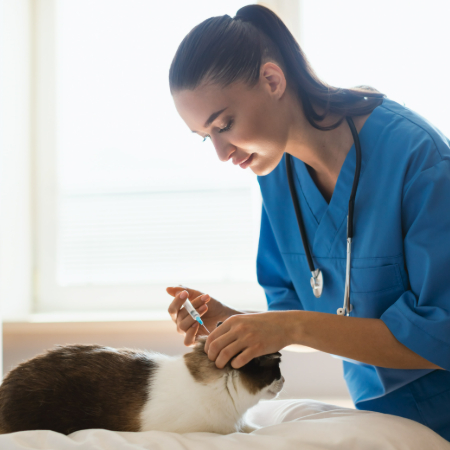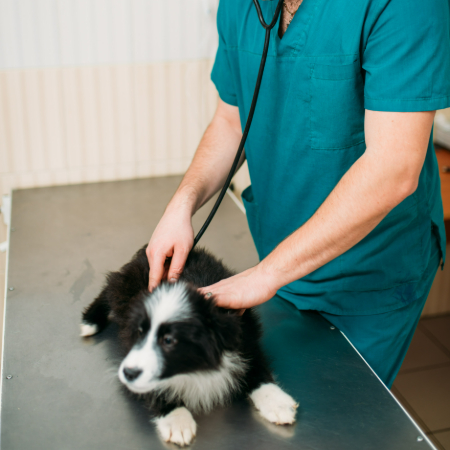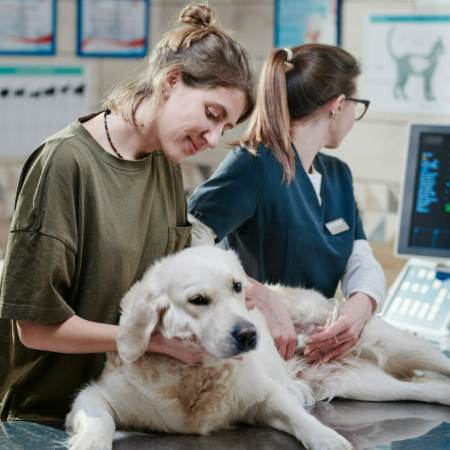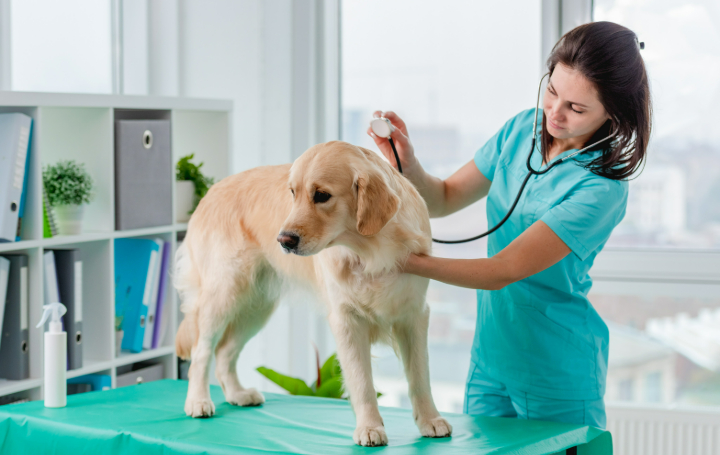The Importance of Routine Veterinary Care: Keeping Your Dog Healthy
As dog owners, we all know how much joy our furry companions bring into our lives. Whether they’re wagging their tails when you come home or snuggling up with you on a lazy afternoon, our dogs have a way of making everything feel better. But just like us, dogs need regular check-ups and care to stay healthy and happy. Routine veterinary care plays a crucial role in ensuring your dog lives a long, healthy life. And the best part? It’s not just about preventing illness – it’s about enhancing their quality of life!
Let’s dive into why routine vet visits are so important and how they can keep your dog in tip-top shape.
1. Preventing Health Issues Before They Start
One of the main reasons to take your dog to the vet regularly is prevention. Just like how we visit our doctors for check-ups, dogs need the same kind of care to catch problems early. Many serious health issues, like heart disease or kidney problems, can be lurking silently in your dog’s body without any obvious signs. Routine check-ups can help your vet spot these problems before they become major concerns. Early detection often leads to easier treatments, less stress on your dog, and a quicker recovery.

For example, routine blood tests can detect changes in your dog’s organs, allowing your vet to start treatment sooner rather than later. By addressing potential health issues early, you could save your dog from unnecessary pain and suffering in the future.
2. Vaccinations Keep Your Dog Safe
Vaccinations are a critical part of routine veterinary care. Just like how we get flu shots and other vaccines to protect ourselves, dogs need certain vaccinations to protect them from harmful diseases. Vaccines help prevent infections that can cause serious illness or even death. For example, distemper, parvovirus, and rabies are all preventable diseases that could be life-threatening to your dog without proper vaccination.
Your vet will ensure that your dog is up-to-date on all necessary vaccinations based on their age, lifestyle, and health status. Keeping track of vaccinations means you’re not only protecting your dog but also the other animals and people they come into contact with.
3. Parasite Prevention: Fleas, Ticks, and Worms
No one likes to think about parasites, but they’re an unfortunate part of pet ownership. Fleas, ticks, and worms are all potential threats to your dog’s health. Routine vet visits include checks for these pesky parasites and provide you with prevention strategies.
Fleas can cause itching and discomfort, while ticks can carry diseases like Lyme disease. Worms, on the other hand, can be sneaky and cause issues ranging from weight loss to digestive problems. Regular vet visits give your dog the protection they need from these parasites, whether it’s through monthly flea preventatives or annual deworming treatments.
4. Dental Health Matters Too
A dog’s dental health is just as important as their overall health, yet it’s often overlooked. Did you know that dental disease is one of the most common health problems in dogs? Plaque and tartar can build up on your dog’s teeth, leading to gum disease, tooth loss, and even infections that could spread throughout the body.
Routine veterinary care includes dental checks, and if necessary, professional cleanings to keep your dog’s mouth fresh and healthy. In addition to vet visits, you can also brush your dog’s teeth at home to prevent build-up. Good dental hygiene can improve your dog’s quality of life, keeping their breath fresh and their smile sparkling.
5. Maintaining a Healthy Weight
Obesity is a growing problem among pets, and just like humans, carrying extra weight can lead to serious health issues for your dog. Joint problems, heart disease, and diabetes are just a few conditions that can arise from being overweight. Regular vet check-ups allow your vet to assess your dog’s weight and body condition. They can recommend the right amount of food, treats, and exercise to help maintain a healthy weight.

If your dog is overweight, your vet can create a tailored weight loss plan to get them back on track. This not only improves their overall health but also ensures they have more energy and feel their best.
6. Tailored Advice for Your Dog’s Life Stage
Your dog’s needs change as they age, and routine vet visits help you navigate these transitions. Puppies, adult dogs, and senior dogs all have unique health requirements. A puppy’s first vet visits are especially important for vaccinations, socialization, and starting them off on the right foot. As your dog gets older, they may face challenges like arthritis, vision problems, or cognitive decline. Your vet will guide you on how to best support them at every stage of their life.
Senior dogs may need more frequent check-ups to monitor their health closely. If your dog is approaching their golden years, it’s even more important to stay on top of routine veterinary care to catch age-related issues early and give your dog the best quality of life possible.
7. Boosting Your Dog’s Mental and Emotional Well-being
Did you know that regular vet visits can also improve your dog’s mental health? While it may seem like a trip to the vet is all about physical health, it’s also an opportunity to foster a positive relationship with their care. Some dogs may feel anxious about going to the vet, but with positive reinforcement and a gentle approach, these visits can be a less stressful experience.
Your vet can also offer tips on how to manage your dog’s behavior, anxiety, or stress. From separation anxiety to socialization issues, there are many ways a veterinarian can help support your dog’s emotional health as well.
8. Building a Strong Relationship with Your Vet
Regular vet visits help build a relationship with your vet, which is crucial for your dog’s overall well-being. The more your dog visits the vet, the more comfortable they will feel with the clinic and the staff. Over time, your dog will recognize the vet’s office as a place where they get love and care, not just poked and prodded.
When you have a solid relationship with your vet, they’ll become more familiar with your dog’s personality and health history. This personal connection can make a big difference if your dog ever faces a health crisis. Your vet will already have a deep understanding of your dog’s unique needs and temperament, making it easier to provide tailored care in emergencies.
9. The Power of Knowledge and Communication
Routine veterinary care isn’t just about the physical exam – it’s also about educating you as a pet parent. Your vet can give you valuable advice on things like grooming, nutrition, exercise, and general care. They can help you understand your dog’s behavior, diet, and any changes in their routine. Keeping an open line of communication with your vet will ensure that you’re always making the best decisions for your dog’s health.

Whether it’s advice on switching to a new food, tips on training, or recommendations for toys and activities that promote mental stimulation, your vet is a valuable resource for all things dog care.
Final Thoughts
Your dog is more than just a pet – they’re part of the family. Taking care of them is a responsibility that should never be taken lightly. Routine veterinary care is the key to making sure your dog lives a long, happy, and healthy life. From vaccinations and parasite prevention to dental health and weight management, your vet’s guidance will help you ensure your dog stays in the best possible shape.
So, don’t wait for something to go wrong – make routine vet visits a regular part of your dog’s life. By investing in their health today, you’ll be rewarded with many years of love, companionship, and tail-wagging fun!
Doglime for more dog-related information.
Tags










